Introduction
Andreas Weber is a biologist, philosopher, and author. He is one of the most interesting authors I have read lately. This is a review of Andreas Weber’s essay Enlivenment (Heinrich Böll Stiftung, 2013), and books Matter & Desire (Chelsey Green Publishing Company, 2014), Biology of Wonder (New Society Publishing, 2016), and Biopoetics (Springer, 2016).
This is a long post. The reviews of the books can also be found here and here and here on Goodreads. The essay, or small e-book, can be downloaded here.
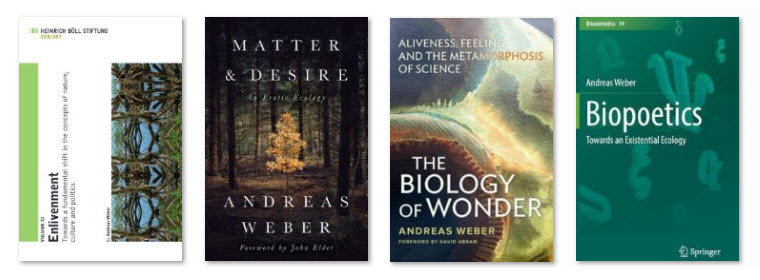
Andreas Weber’s books are pulsating with life. The 1st book, Matter & Desire, is pulsating with erotic ecology; the 2nd, Biology of Wonder, with poetic ecology; and the 3rd, Biopoetics, with existential ecology.
Enlivenment
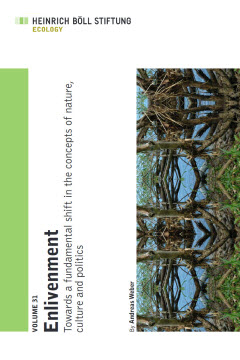
Andreas Weber sees Enlivenment as a way to move beyond Enlightenment. Enlivenment is a way to acknowledge the deeply creative processes embodied in all living organisms. It complements the rational thinking of the Enlightenment. Weber writes that rational thinking is an ideology that focuses on dead matter. It has no way of comprehending lived experience. We have forgotten what life means. It is a logical outcome of our rational culture.
Andreas Weber argues that lived experience and embodied meaning are key factors that cannot be excluded from a scientific picture of the biosphere. The experience of being alive connects us to all living organisms. Enlivenment is a set of deep ordering principles for how to perceive and act. It seeks to advance our freedom to be alive-in connectedness.
Feeling our needs and having them satisfied is directly related to our aliveness. All living beings are subject to the same natural dynamics. Sentience and felt expression is the way living beings exist. Meaning and expressiveness are deeply rooted in nature. Nature is a relational network between living beings who have individual interests to stay alive, grow, and unfold. Science must take these lived dimensions into account.
If we are convinced that we have to describe reality as non-living, life and living processes become highly problematic. If we see the biosphere as non-living, this will inevitably lead to a lack of concern toward life and indifference to lived experience. Seeing reality as a living process literally changes everything. This opens up a new view of the organic world in which organisms play a creative role.
The simplest organism displays the intention to maintain itself. An organism is a subject with a body. It expresses the conditions under which living processes take place. The experience of being alive and full of life is a fundamental component of reality. The desire for lived experience and to become one’s own full self is a fundamental part of reality.
Andreas Weber argues that nature is a commons. He mentions that self-organized communities of people are inventing their own forms of governance. Elinor Ostrom, who won the Nobel Prize in Economics in 2009, found that local freedom is a critical factor. Local freedom is necessary for the cohesion of the encompassing whole. Projects that are sustainable long-term always satisfies the commoners in multi-dimensional ways.
Andreas Weber also refers to Manfred Max-Neef’s Matrix of Human Needs. Meeting needs and building community are combined in commoning. Weber is influenced by Christopher Alexander and describes commons as centers of aliveness. We all share lived experiences. We all know how it feels to be alive in the world. This is the deepest knowledge that we can access.
Living beings perceive value and meaning from within, and they manifest their desire to stay alive. Being a body and having feelings is an irreducible fact and experience. The key point is that all living beings share the experience of a meaningful core self that is concerned with what happens to it and strive to keep itself alive.
Many of our current difficulties is because we have built an entire civilization upon a flawed foundation. The world is inherently creative and alive. We need to be carefully observant of felt life. This is the switch from Enlightenment to Enlivenment.
Matter & Desire
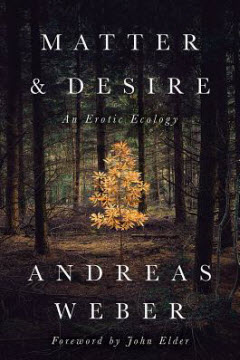
Andreas Weber pursues an ambitious goal with Matter & Desire. He investigates the principles of reality that we experience and are part of through a science of the heart. It became clear to Weber that we need to completely rethink how we understand life and its significance. It also means that we have understood very little, or have forgotten very much, about life.
Andreas Weber describes being in the world as an erotic encounter. It’s an encounter of meaning through contact, and of being oneself through the significance of others. Weber sees ecology as a relational system, and love as an ecological process.
Andreas Weber writes that 1) to love, we must understand life; 2) to be able to love, we must be able to be alive; and 3) to allow oneself to be fully alive is to love oneself and the world, which is alive. We are currently neglecting this because our efforts to understand the world are directed away from the experience of being alive, from aliveness.
Life is the creative transition from controlled situations to openings that cannot be controlled. Being in tune with life lies between following principles and improvising. Every life-form is an unbroken chain of self-organization. The world is a symphony of relationships between participants that are changed by the interaction.
After two hundred years of trying to bring about Enlightenment, we have put the Earth in a position more precarious than it has been in for the past two hundred million years. It could be that the planet is not suffering from an environmental crisis, but from a shortage of our love. Love is the inside of aliveness.
Biology of Wonder
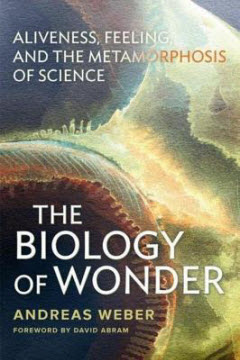
Andreas Weber writes in Biology of Wonder that the more technology allows us to study life, the stronger the evidence of life’s complexity and intelligence becomes. For two hundred years, biology made no major efforts to answer what life really is. Most biologists assumed organisms to be tiny machines. Today, this belief is shaken.
Organisms are not machines assembled from discrete pieces, but unities held together by feeling what is good or bad for them. 1) All living bodies are bodies of feeling. 2) The wish to live is visible in the living body of each being. 3) Only in the mirror of other life, in the eyes of the other, can we unlock the depths in ourselves.
Feeling and experience guide ecological functioning. Organisms are feeling, sentient systems that interpret their environments. Biology is discovering that even the simplest organisms act according to values. Every living being is connected to reality through the experience of being alive. It is what defines an organism.
The new biology currently finds itself in a situation comparable to that of physics hundred years ago. It views feeling as the primary explanation of all life processes. Feeling is the inner experience of meaning. The subjectivity of a living organism is an objective reality in its own right. Value and feeling are at the center of a scientific description of living organisms. This is radical and not, yet, readily understood.
We experience the world primarily with our senses and bodies. Our need to be connected, to be seen, to be loved, spring forth from our bodily existence. We are part of a web of meaningful inter-penetrations of being. Without experiencing natural beauty and real connectedness to a living world, we end up lifeless and deformed.
Andreas Weber writes that the conceptual framework we have invented to understand organisms is the deeper reason for our environmental catastrophe. We are extinguishing life because we have blinded ourselves to it. We treat it cruelly because we believe it to be machinery. Centuries of humanitarian and ecological disasters lie behind us, and bigger ones lie ahead. How we understand life itself will decide our future.
Andreas Weber argues that we share a rich common ground with all other living beings. He writes about nature, not as an object, but as a subject of living experience. Feeling and value are crucial in the phenomenon of life. Weber has spent his life searching for life’s nameless “something”. Life literally creates itself. Organisms do anything to ensure their continued existence. The desire to live is primary. Everything that lives wants more life. The wish to live is visible. We are entangled with others.
Andreas Weber proposes that the that world is governed by poetic ecology. Matter forms mutually transformative bonds and relationships. It is creative without centralized control. Objects assemble themselves into more complex forms of their own volition. Poetic ecology restores humanness, without sacrificing the otherness of other beings. It connects deep human experiences with a scientific understanding of life. The world is vibrant with feeling.
Living beings are autonomous to a certain degree. They act as a whole and not as parts obeying external laws. There are no governing orders, only signs of meaning. All levels of biological existence have the ability to arrange matter into desired configurations. The body knows through acting on what is good. What matters most for all organisms is to act in a way that makes sense. Organisms continuously maintain themselves as a whole. They strive to regenerate, grow and maintain their boundaries against internal fluctuations and external disturbances.
Andreas Weber emphasizes that it is profoundly misleading to compare an organism to a machine. Machines do not bring forth themselves. They have no active interests. They do not resist being switched off. Organisms, on the other hand, struggle to perpetuate their own existence. To be alive means to maintain one’s own body, and to have an active self-interest in one’s own circumstances. A living being is deeply invested in preserving its particular form and in its freedom to act. Every organism chooses and decides. Organisms have to be free out of necessity.
Feeling is the common language of all living beings. It resides in the coherence of the body. The body reacts to the expression of another body because it feels its meaning and seeks to understand the consequences for its own coherence. Experience is mediated through feeling. In the depth of felt experience, everything is an integrated whole.
Our connection with other beings happen on a deep level. These deep principles cannot be verbalized. They can only be experienced. Andreas Weber writes that amidst our elaborate concepts lingers a gigantic blank spot. We underestimate and misjudge everything that cannot speak with words — until some decades ago, even children. We systematically deny what we can know, what we can experience through our bodies. Feeling comes before form. All organisms are connected in a meshwork of experiences which is existentially real.
Every experience has been a source of suspicion since the birth of modern science two hundred years ago. It goes back to Descartes’ idea that sensory experiences are not reliable from a scientific standpoint. And it is an example of our reliance on rational calculation, which makes today’s loss of life possible.
We are living in a biosphere whose depth and extension we cannot grasp, and which is continuously regenerating itself and us. The biosphere of our blue planet is one single interwoven system. With the plentitude of life disappearing, we lose a dimension which is beyond any calculation. All life is a meshwork, where everything depends on everything, and all move through the movement of all. The value of life is immeasurable because it is all there is. If the biosphere dies, we can no longer exist. At the end of all calculations, the value of life is infinitely high.
Living reality depends on a balance between autonomy and relatedness. Feeling alive, or enlivened, is a way to experience whether relationships are healthy or not. It is embedded in all life and is part of the relational structure of the world. By the experience of enlivenment we are able to evaluate the life-giving potential of any situation.
Biopoetics
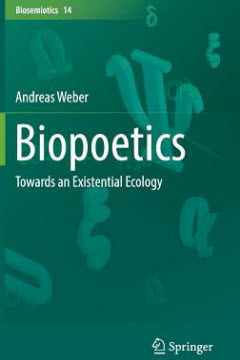
Biopoetics connects our human experience with a scientific understanding of life. A major limitation of conventional scientific objectivity is the exclusion of the first-person subjective perspective. Rational thinking has omitted the rationality of the living body.
Andreas Weber proposes an existential poetics for living systems: 1) Perception and communication always means to be touched on a bodily level. 2) To be touched means to be entangled. 3) Every relationship is a mutual transformation. The world speaks to itself through living relations. In perceiving we participate in the world. And through communication we tranform the world.
Poetic creativity is the ability to know something through participation. We need to understand life as a deeply sense-creating phenomenon. Organisms live in existential, felt realities, which they experience through their selves. Life is operating on meaning.
All living beings are concerned with their survival, and hence, with value, with what is good and bad. Feeling is a physical factor. This is the foundation from which an explanation of life can start. Organisms bring forth themselves physically. They continuously generate and specify their own organization. This is described by the term autopoiesis, which literally means self-creation.
Andreas Weber builds a unifying frame for the emerging new biology. The challenge is to reintroduce felt aliveness in our picture of the world after two hundred years of Enlightenment thinking. Weber activates a new language. He contrasts techne with poiesis. Techne means analysis and replication. Poiesis, on the other hand, means creative self-realization. Techne is cause-and-effect and control. Poiesis is inner goal-directedness and self-expression.
Living beings bring forth themselves. They retain their integrity in the face of changes in the environment. A living being exists as a self-identical structure in time and space, although it is not materially identical with itself. An organism decides and chooses according to its needs. It realizes itself anew in every moment. It is free because it shows an intention to stay alive.
Organisms behave as a whole. They are free by necessity. They interpret and do not obey. A machine is dependent on causal order. An organism, on the other hand, is not causally determined. It is enfolded in its ecosystem and continuously recreates itself. Its behavior expresses the overall situation. Meaning is one of its fundamental dimensions of existence. And the background in bringing forth meaning is always existential.
Empirical objectivity, which we are so familiar with, can be enlarged with an empirical subjectivity. All living beings have a shared condition of feeling and experience. Andreas Weber writes that subjectivity is the principle of organic behavior and becomes visible in its form. Form is related to what an organism feels. Feeling is turned toward the world. Meaning is sensually experienced expression.
Life celebrates itself in living. Life always has to confirm its existence to assure its continuation. A living being is an embodied subject which can make choices. Life is matter and meaning intertwined. All living beings articulate themselves as wholes through feeling. Living beings enfold matter through their metabolism. Their matter at no moment remains one and the same. They change to maintain themselves.
The organic mode of existence is feeling rather than calculation. The ability to feel our and other’s needs is fundamental. Embodied subjectivity holds a living being together. Value guides an organism’s self-maintenance. Our bodies bring forth subjective reality. Life happens in between mind and matter. Genes and soma interact in mutual transformation.
Intention, concerns of a living subject, is logically inevitable. It cannot be circumvented, and neither be calculated away. Life is non-computable. Meaning-making requires a body. Embodied logical contradiction manifests as a need. Need allows autonomy to come into the picture. The unity which an organism creates is a micro version of the larger whole. Contradictions enhance one another through mutal transformations.
Purpose is always felt. It is the basic experience of being alive. There is an embodied logics which, at the same time, is inclusive and contradictory. The basic experience of the whole is to realize oneself as purpose. Living beings bring forth wholeness. They are self-sustained wholes.
Form is both a necessity and a constraint. It both enables and makes dependent. Individual existence means to be whole in a larger whole. Metabolism is the transformation of the whole into self, and of self into the world. It is the world passing through self as self.
Living reality is a logics of dialogue. It is necessarily dynamic. Dialogics is a process based on renegotiations of relationship. Encounters are experienced as meanings. A subject experiences itself as an inside with an outside. Every touch is to be touched. Every seeing might mean to be seen. Perception is a meaningful space in between. Bodies continuously transform themselves in living relationships.
Organisms participate in one another. Organisms need others and the whole in order to be. Being an organism means sharing, and sharing is change in relationship with others. Together they form commons.
Being a body is an irreducible experience. Having feelings and (non-verbal) interactions are empirical facts. They are lived dimensions that are shared among all living beings. We are, on an empirical biological level, part of a living cosmos, which is subject to a general principle of life. We are all supported by life itself.
The causal-mechanical approach as a whole is mistaken. Reality is meaning-centered, open to creative change, and continuously bringing forth agents with subjective experiences. We are entagled in the creative aliveness of nature, and as a culture we must honor this aliveness.
We have to drop the separation of inside and outside. There is a deep entanglement between the individual and the world, which makes both inseparable. Entanglement is the way we come into being. Feeling is the existential experience of meaning. It is the basic experience of being interconnected and separate. To live is to be self and other at the same time.
Conclusions
Rational thinking focuses on dead matter. It has no way of comprehending lived experience. Poetry, on the other hand, is the logic of the living world. It enables new experiences and insights. Poetry answers questions with questions. It opens the space for new inquiries. Living beings, and life itself, is unfathomable. We live within a poetic space. If we could only listen and feel.
We can readily discern what enhances aliveness for the simple reason that we are also alive. But introducing aliveness into our understanding of the world is also to deeply challenge the predominating worldview. The feeling of aliveness is a way to understand the world. Life is contagious with aliveness. Aliveness is intrinsic in life itself.
The best way to ensure our long-term survival is to honor our own aliveness. Beauty is felt aliveness. It is also healing. Ultimately, this is about learning to love. Love is the inside of aliveness.
Related posts:
Book Review: Enlivenment
Book Review: Matter and Desire
Book Review: Biology of Wonder
Book Review: Biopoetics
Leave a Reply
You must be logged in to post a comment.